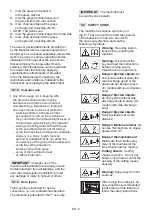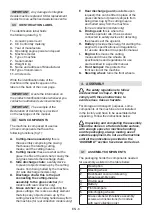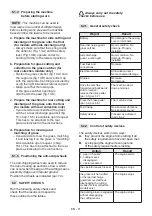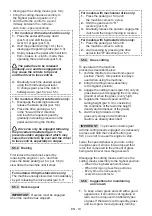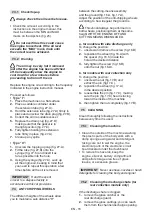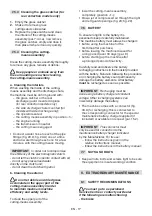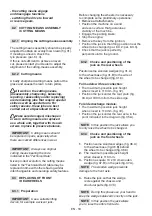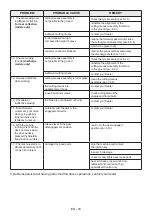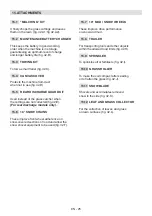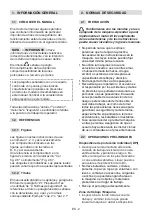
EN - 18
- the cutting means engage
and disengage functions
- switching the drive to forward
or reverse gears.
8.2 CUTTING-MEANS ASSEMBLY
/ CUTTING MEANS
8.2.1 Aligning the cutting-means assembly
The cutting-means assembly should be properly
adjusted to obtain an evenly mown lawn (fig. 31).
If mowing is uneven, check the
tyre pressure (par. 6.1.3).
If this is not sufficient to achieve an even
cut, please contact your Dealer to adjust the
alignment of the cutting-means assembly.
8.2.2
Cutting means
A badly sharpened cutting means pulls at the
grass and causes the lawn to turn yellow.
All work on the cutting means
(disassembly, sharpening, balancing,
repairing, reassembly and/or replacing)
are demanding jobs that require special
skills as well as special tools. For
safety reasons, these jobs are best
carried out at a Specialised Centre.
Make sure damaged, misshapen
or worn cutting means are replaced
as a whole unit, together with its own
screws in place to preserve balance.
IMPORTANT
Cutting means should
be replaced in pairs, especially when
there are marked differences in wear.
IMPORTANT
Always use original
cutting means bearing the code
indicated in the “Technical Data”.
Given product evolution, the cutting means
listed in the "Technical Data" table may be
replaced in time with others having similar
interchangeable and operating safety features.
8.3 REPLACING OF FRONT
/ REAR WHEELS
8.3.1 Preparation
IMPORTANT
Use a suitable lifting
device, for example a scissor jack.
Before changing the wheels it is necessary
to complete some preliminary operations:
•
Remove all attachments.
• Position the machine on a solid
and even surface that guarantees
stability of the machine.
•
Engage the parking brake;
•
Stop the engine;
•
Remove the key from the ignition;
•
Position the jack in the lifting position near the
wheel to be changed (par. 8.3.2; par. 8.3.3).
•
Check that the jack is perfectly
perpendicular to the ground.
8.3.2 Choice and positioning of the
jack on the rear wheels
Position some wooden wedges (fig. 31.A)
to the wheel base (fig. 31.B) to the side of
the wheel to be changed (fig. 31.C).
For models with rear collection:
•
The maximum possible jack height
when closed is 110 mm. (fig. 32).
•
Position the jack under the rear plate (fig.
33.A) at 180 mm from the side edge.
For side discharge models:
•
The maximum possible jack height
when closed is 110 mm. (fig. 34).
•
Position the jack under the rear axle, in the
point indicated in the diagram (fig. 35.A).
NOTE
In this position the jack allows you
to only raise the wheel to be changed.
8.3.3 Choice and positioning of the
jack on the front wheels
1.
Position some wooden wedges (fig. 36.A)
to the wheel base (fig. 36.B) behind
the wheel to be changed (fig. 36.C).
2.
The maximum possible jack height
when closed is 110 mm.
3.
Position a square 10 x 10 cm wooden
wedge (fig. 37.B) on the jack (fig. 37.A).
NOTE
The wooden wedge prevents
damage to the front axle.
4.
Raise the jack so that the wedge
rests against the chassis and
structural parts (fig. 37.C).
NOTE
During this phase use your hand to
keep the wedge balanced correctly on the jack.
NOTE
In this position the jack allows
you to raise the entire front axle.
Summary of Contents for KLX 108 Series
Page 2: ......
Page 5: ...4 3 I II A B C D E A F G H A B C D A E H F G 5 B C C A A B C D E ...
Page 6: ...6 I II A C C B OK NO A B C D D E F F G G 7 B 2 A C B 2 A D C B D 1 E D E 1 A B B 1 B B ...
Page 7: ...8 9 A B C C D D H H E G F G F E 5 H H I I I I J K O N L O N M ...
Page 8: ...10 J A B C D E E 1 F G H I K L E F II I 11 12 A A ...
Page 9: ...14 13 A B 15 16 A C B B A 17 A H H 30 mm H 10 mm H 20 mm H 0 mm 18 A C B D A C B A H ...
Page 10: ...23 19 A 20 21 22 1 3 A 1 B A A B 24 A 25 26 ...
Page 11: ...A B C A B C A A II I 27 B C A 28 29 30 ...
Page 12: ...A A 31 32 33 A 110 mm 34 35 36 A 180 mm 110 mm A A B C ...
Page 13: ...37 38 B A C C 39 A D B C 40 A B 41 A A I A B C D D II A A B C 42 ...
Page 14: ...43 A1 A2 B m a x 2 4 5 N 2 5 k g m a x 9 8 0 N 1 0 0 k g C C D E F G H I J L K ...


